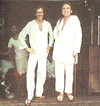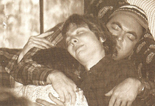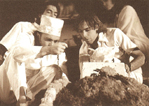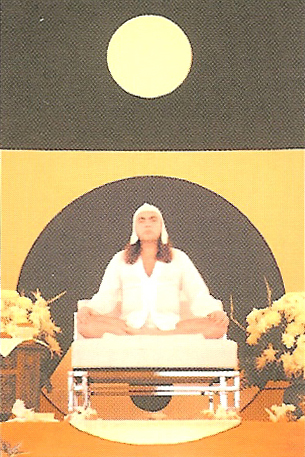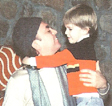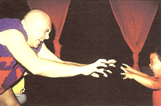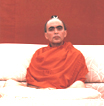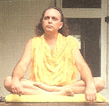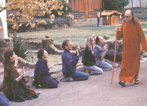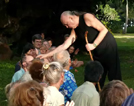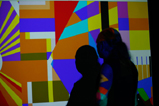Adi Da Up Close
Audio/Video Library
4,374,499 viewings/listens here since our AUDIO/VIDEO LIBRARY opened on Jan. 27, 2009.
(For more, see our graph.)
Our multimedia library currently contains 1,010 YouTube video clips and audio clips about (or related to) Adi Da and Adidam.
[Contains Finnish subtitles. If the CC icon ("Subtitles/closed captions") has a red line under it, the subtitles should appear. If you don't see them, just press the CC icon to turn them on.]
Ote keskustelutuokiosta heinäkuulta 1978.
"Elä tulessa ja puhdistu" ("Live In the Fire and Be Purified") is an excerpt from the longer talk, "The Fire Must Have Its Way". The full talk is available on the DVD, The Fire Must Have Its Way, on which this is track 3. It is also available as a CD. The talk also appears in written form in the book, My "Bright" Sight and online here.
Tags: CD DVD Finnish

Ote keskustelutuokiosta heinäkuulta 1978.
"Elä tulessa ja puhdistu" ("Live In the Fire and Be Purified") is an excerpt from the longer talk, "The Fire Must Have Its Way". The full talk is available on the DVD, The Fire Must Have Its Way, on which this is track 3. It is also available as a CD. The talk also appears in written form in the book, My "Bright" Sight and online here.
Tags: CD DVD Finnish
[Contains Finnish subtitles. If the CC icon ("Subtitles/closed captions") has a red line under it, the subtitles should appear. If you don't see them, just press the CC icon to turn them on.]
Taipumuksiltaan ihmiset ovat sidottuja elämän luonnolliseen aaltoilevaan kiertoon. Ruumiillinen nautinto tai hengelliset harjoitukset eivät tuota todellista vapautta tästä jatkuvasta liikkeestä. Ensimmäinen valinta korostaa ainoastaan laskevia (tai ruumiillisia) kokemuksia, ja toinen nousevia (tai mystisiä) kokemuksia.
Tässä varhaisessa keskustelussa Avatar Adi Da selvittää, miten suhde Guruun (eli Satsang) mahdollistaa vapauden tästä loukusta, koska Guru on sen Olotilan Ilmentymä, joka on Aiempi kuin tämä konemainen kierre, eli hän elää sen tuolla puolen.
"Guru on muuttumaton vakaus elämän aallonharjojen ja pohjien keskellä" ("The Guru is Constant Stability Amidst the Highs and Lows of Life") is an excerpt from the DVD, The Relationship To The Guru Is The Constant In Life.
Watching this DVD will transport viewers to a special moment in Adidam history. July 29, 1973, was the day Avatar Adi Da left Los Angeles for a Yajna (sacred journey) through India and Nepal. He returned as “Bubba Free John”, His first spontaneously revealed Teaching-Name. Thus, this was the last Discourse He gave as “Franklin Jones” (Avatar Adi Da’s birth name).
Tags: DVD Finnish

Taipumuksiltaan ihmiset ovat sidottuja elämän luonnolliseen aaltoilevaan kiertoon. Ruumiillinen nautinto tai hengelliset harjoitukset eivät tuota todellista vapautta tästä jatkuvasta liikkeestä. Ensimmäinen valinta korostaa ainoastaan laskevia (tai ruumiillisia) kokemuksia, ja toinen nousevia (tai mystisiä) kokemuksia.
Tässä varhaisessa keskustelussa Avatar Adi Da selvittää, miten suhde Guruun (eli Satsang) mahdollistaa vapauden tästä loukusta, koska Guru on sen Olotilan Ilmentymä, joka on Aiempi kuin tämä konemainen kierre, eli hän elää sen tuolla puolen.
"Guru on muuttumaton vakaus elämän aallonharjojen ja pohjien keskellä" ("The Guru is Constant Stability Amidst the Highs and Lows of Life") is an excerpt from the DVD, The Relationship To The Guru Is The Constant In Life.
Watching this DVD will transport viewers to a special moment in Adidam history. July 29, 1973, was the day Avatar Adi Da left Los Angeles for a Yajna (sacred journey) through India and Nepal. He returned as “Bubba Free John”, His first spontaneously revealed Teaching-Name. Thus, this was the last Discourse He gave as “Franklin Jones” (Avatar Adi Da’s birth name).
Tags: DVD Finnish
[Contains Finnish subtitles. If the CC icon ("Subtitles/closed captions") has a red line under it, the subtitles should appear. If you don't see them, just press the CC icon to turn them on.]
"Tämä paikka ei ole utopia" ("This Place Is Not a Utopia") is an excerpt from an Avataric Discourse given by Adi Da Samraj on October 6, 2005, at the Mountain Of Attention Sanctuary.
ADI DA: "I find people's sorrows and losses to be heartbreaking and terrible and an immense burden and I am sympathetic and bless people in their trouble. However you must understand that is the nature of this place. This is not utopia, it is not paradise. It is a place of death, endings, suffering, brief amusements. It is not enough and merely to react to your difficulties for overlong and try to make an entire life out of it is fruitless. You do have to move on beyond that reaction to any moments suffering and loss. You must know the place you’re in and live in accordance with that knowledge instead of being sympathetic with some false view of the world or self or trying to idealize some aspect of potential experience, indulging in what amounts to addictions, repetitions of experiences, in order to avoid the knowledge of what is inherent in life, as well as all the hell that is coming on earth and is here. You will not be fulfilled.”
Tags: Finnish Avataric Discourse

"Tämä paikka ei ole utopia" ("This Place Is Not a Utopia") is an excerpt from an Avataric Discourse given by Adi Da Samraj on October 6, 2005, at the Mountain Of Attention Sanctuary.
ADI DA: "I find people's sorrows and losses to be heartbreaking and terrible and an immense burden and I am sympathetic and bless people in their trouble. However you must understand that is the nature of this place. This is not utopia, it is not paradise. It is a place of death, endings, suffering, brief amusements. It is not enough and merely to react to your difficulties for overlong and try to make an entire life out of it is fruitless. You do have to move on beyond that reaction to any moments suffering and loss. You must know the place you’re in and live in accordance with that knowledge instead of being sympathetic with some false view of the world or self or trying to idealize some aspect of potential experience, indulging in what amounts to addictions, repetitions of experiences, in order to avoid the knowledge of what is inherent in life, as well as all the hell that is coming on earth and is here. You will not be fulfilled.”
Tags: Finnish Avataric Discourse
[Contains Finnish subtitles. If the CC icon ("Subtitles/closed captions") has a red line under it, the subtitles should appear. If you don't see them, just press the CC icon to turn them on.]
"Oletko oppinut tuntemaan täydellisesti?" ("Have You Learned To Feel Perfectly?") is an excerpt from the longer talk, "The Fire Must Have Its Way". The full talk is available on the DVD, The Fire Must Have Its Way, on which this is track 1. It is also available as a CD. The talk also appears in written form in the book, My "Bright" Sight and online here.
The bottom line: If you want to feel good, you have to learn how to feel good!
ADI DA: Jotenkin, kaiken tämän keskellä, tajuat että kaikki voisi tuntua paljon paremmalta. Voisit tuntea olevasi täysin autuas. Voisit rakastaa ehdottomasti, voisit olla ehdottoman vapaa. Mutta tämä näyttää tavallisen olotilasti vastakohdalta. Olet riippuvainen kaikenlaisista reaktiivisista tunteista, matalista energiatasoista, huomion pakkomielteistä, psyko-fyysisistä tukkeutumista, olet riippuvainen kaikesta tästä, sinulla on miljoona, lukematon määrä ohjelmia, jotka ovat vähemmän kuin rakkaus, joista olet riippuvainen. Mieli on kiinnittynyt halun ja huomion ohjelmistoon. Ja jokaisella ohjelmalla on omat kohteensa joka hetkessä. Mieli pyrkii kohti yhtä tai toista kohdetta, huomiosi liikkuu kohti yhtä tai toisenlaista kohdetta. Se, miltä sinusta tuntuu joka hetkellä, on ilmaisu siitä mielen ohjelmasta, johon olet siinä kohtaa lukittuna.
Mitä olet koko elämäsi aikana oppinut? Oletko oppinut tuntemaan täydellisesti? Tuntemaan täysin? Jouduitko käymään läpi opintokauden,\Njossa opit tuntemaan äärettömiin, ehdottomaan Jumalaisuuteen asti? Ei - opit elämän kaikki reaktiokuviot, kaiken tavanomaisen halun. Ja tunsit ne ennen kuin tutustuit niihin uudellen tässä vartalossa. Eli itselläsi ei voi olla parempaa\Noloa kuin itselläsi voi olla. Ja olet riippuvainen tuntemaan itsesi vähempänä kuin rakkaus, ollaksesti vähemmän kuin ekstaasi.
ADI DA: Somehow in the midst of this round of existence you realize that you can feel a lot better than you now feel, that you can feel absolutely blissful, that you can love absolutely, that you can be absolutely free. But feeling blissful stands in contrast to your common state. You are addicted to reactive emotion, low levels of energy, gross fixations of attention, psycho-physical obstruction. You are addicted to countless programs that are less than love. In every moment your attention is moving toward one or another object, and your feeling in every moment is an expression of the program of mind into which you are locked in that moment.
Now, what have you learned in your whole life? Have you learned to feel perfectly? To feel absolutely? Did you ever go through a period of study in which you learned to feel to Infinity, to feel Absolute Divinity? No, you learned all the reactive patterns of life, all the desires for ordinary things. You knew them even before you became familiar with them again in this body. You cannot feel any better than you can feel, and you are addicted to feeling less than love, to being less than ecstasy.
Tags: Finnish DVD CD

"Oletko oppinut tuntemaan täydellisesti?" ("Have You Learned To Feel Perfectly?") is an excerpt from the longer talk, "The Fire Must Have Its Way". The full talk is available on the DVD, The Fire Must Have Its Way, on which this is track 1. It is also available as a CD. The talk also appears in written form in the book, My "Bright" Sight and online here.
The bottom line: If you want to feel good, you have to learn how to feel good!
ADI DA: Jotenkin, kaiken tämän keskellä, tajuat että kaikki voisi tuntua paljon paremmalta. Voisit tuntea olevasi täysin autuas. Voisit rakastaa ehdottomasti, voisit olla ehdottoman vapaa. Mutta tämä näyttää tavallisen olotilasti vastakohdalta. Olet riippuvainen kaikenlaisista reaktiivisista tunteista, matalista energiatasoista, huomion pakkomielteistä, psyko-fyysisistä tukkeutumista, olet riippuvainen kaikesta tästä, sinulla on miljoona, lukematon määrä ohjelmia, jotka ovat vähemmän kuin rakkaus, joista olet riippuvainen. Mieli on kiinnittynyt halun ja huomion ohjelmistoon. Ja jokaisella ohjelmalla on omat kohteensa joka hetkessä. Mieli pyrkii kohti yhtä tai toista kohdetta, huomiosi liikkuu kohti yhtä tai toisenlaista kohdetta. Se, miltä sinusta tuntuu joka hetkellä, on ilmaisu siitä mielen ohjelmasta, johon olet siinä kohtaa lukittuna.
Mitä olet koko elämäsi aikana oppinut? Oletko oppinut tuntemaan täydellisesti? Tuntemaan täysin? Jouduitko käymään läpi opintokauden,\Njossa opit tuntemaan äärettömiin, ehdottomaan Jumalaisuuteen asti? Ei - opit elämän kaikki reaktiokuviot, kaiken tavanomaisen halun. Ja tunsit ne ennen kuin tutustuit niihin uudellen tässä vartalossa. Eli itselläsi ei voi olla parempaa\Noloa kuin itselläsi voi olla. Ja olet riippuvainen tuntemaan itsesi vähempänä kuin rakkaus, ollaksesti vähemmän kuin ekstaasi.
ADI DA: Somehow in the midst of this round of existence you realize that you can feel a lot better than you now feel, that you can feel absolutely blissful, that you can love absolutely, that you can be absolutely free. But feeling blissful stands in contrast to your common state. You are addicted to reactive emotion, low levels of energy, gross fixations of attention, psycho-physical obstruction. You are addicted to countless programs that are less than love. In every moment your attention is moving toward one or another object, and your feeling in every moment is an expression of the program of mind into which you are locked in that moment.
Now, what have you learned in your whole life? Have you learned to feel perfectly? To feel absolutely? Did you ever go through a period of study in which you learned to feel to Infinity, to feel Absolute Divinity? No, you learned all the reactive patterns of life, all the desires for ordinary things. You knew them even before you became familiar with them again in this body. You cannot feel any better than you can feel, and you are addicted to feeling less than love, to being less than ecstasy.
Tags: Finnish DVD CD
[Contains Finnish subtitles. If the CC icon ("Subtitles/closed captions") has a red line under it, the subtitles should appear. If you don't see them, just press the CC icon to turn them on.]
Tässä aiemmin julkaisemattomassa keskustelussa Adi Da puhuu positiivisesta harhojen haihtumisesta ja sen tarpeellisuudesta kuolevaisen elämän parissa. Positiivinen harhojen haihtuminen ilmenee, kun yksilö alkaa ymmärtää rasittavaa ja lopulta turhaa etsintäänsä, jossa hän hakee jatkoa elämälleen, maailmallista onnea, ja lopullista elämän täyttymystä — ja alkaa myös luopua siitä. Vain silloin yksilö voi alkaa huomioimaan, oppimaan, ja ekstaattisesti osallistumaan Itse Todellisuuteen, suhteessa Aitoon Toteuttajaan.
In this excerpt from an Avataric Discourse, Adi Da speaks about the necessity to become disillusioned with mortal life in a positive sense. Positive disillusionment is emerging when one begins to understand and relinquish the stressful and ultimately futile search for personal survival, worldly happiness, and ultimate life fulfillment. Only then can one be drawn into recognizing, learning about, and ecstatically participating in Reality Itself, in relationship to a True Realizer.
ADI DA: The teaching of Truth is for those who are disillusioned in the positive sense, who have been sobered in their lives by grasping the nature of existence and being cured of search.
Tags: Avataric Discourse Finnish

Tässä aiemmin julkaisemattomassa keskustelussa Adi Da puhuu positiivisesta harhojen haihtumisesta ja sen tarpeellisuudesta kuolevaisen elämän parissa. Positiivinen harhojen haihtuminen ilmenee, kun yksilö alkaa ymmärtää rasittavaa ja lopulta turhaa etsintäänsä, jossa hän hakee jatkoa elämälleen, maailmallista onnea, ja lopullista elämän täyttymystä — ja alkaa myös luopua siitä. Vain silloin yksilö voi alkaa huomioimaan, oppimaan, ja ekstaattisesti osallistumaan Itse Todellisuuteen, suhteessa Aitoon Toteuttajaan.
In this excerpt from an Avataric Discourse, Adi Da speaks about the necessity to become disillusioned with mortal life in a positive sense. Positive disillusionment is emerging when one begins to understand and relinquish the stressful and ultimately futile search for personal survival, worldly happiness, and ultimate life fulfillment. Only then can one be drawn into recognizing, learning about, and ecstatically participating in Reality Itself, in relationship to a True Realizer.
ADI DA: The teaching of Truth is for those who are disillusioned in the positive sense, who have been sobered in their lives by grasping the nature of existence and being cured of search.
Tags: Avataric Discourse Finnish
[Contains Finnish subtitles. If the CC icon ("Subtitles/closed captions") has a red line under it, the subtitles should appear. If you don't see them, just press the CC icon to turn them on.]
Tässä puheessa vuodelta 2005 Adi Da Samraj käsittelee Vapautuksen mahdottomuutta tieteen tai tavanomaisen uskonnon kautta.
"Et Näe Huonetta Sellaisena Kuin Se On" ("You Do Not See the Room As It Is") is a video excerpt from an Avataric Discourse given by Adi Da at Adi Da Samrajashram, on January 21, 2005. The Avataric Discourse is available on the DVD, Beyond Sex, Science, and self.
In this Discourse, Adi Da explains why Liberation cannot ever be achieved through science or conventional religion.
Tags: Finnish DVD Avataric Discourse

Tässä puheessa vuodelta 2005 Adi Da Samraj käsittelee Vapautuksen mahdottomuutta tieteen tai tavanomaisen uskonnon kautta.
"Et Näe Huonetta Sellaisena Kuin Se On" ("You Do Not See the Room As It Is") is a video excerpt from an Avataric Discourse given by Adi Da at Adi Da Samrajashram, on January 21, 2005. The Avataric Discourse is available on the DVD, Beyond Sex, Science, and self.
In this Discourse, Adi Da explains why Liberation cannot ever be achieved through science or conventional religion.
Tags: Finnish DVD Avataric Discourse
[Contains Finnish subtitles. If the CC icon ("Subtitles/closed captions") has a red line under it, the subtitles should appear. If you don't see them, just press the CC icon to turn them on.]
"Onko Muurahaisella Egoa?" ("Is an ant an ego?") is a video excerpt from a humorous and profoundly insightful Avataric Discourse (given by Adi Da on October 20, 2004 at Adi Da Samrajashram), Adi Da considers the difference between self-consciousness and egoity, referring to both humans and non-humans (including dogs, ants, and trees).
ADI DA: [Laughs] You generally attribute egoity to human beings, but you wonder about everything else. For instance, what about not something relatively inert like a rug or even just standing there and not seeming to be particularly responsive, like a tree. But what about a dog? Is a dog, do you think dogs are egos when you see them, just as readily as you think of human beings as egos? But, why do you draw the line? I mean how far does it go? Where do you stop thinking of living entities, at least, as egos? Do you just presume everything bigger than a cricket is an ego? Or is everything that moves in your, from your perspective experientially or in your natural presumptions, how far do, does the fact of egoity extend in your presumption.
Well, is an ant an ego in your presumption?
The word “ego” is actually a Greek word which means “I”. I consider it with you and talk about it in terms of self-contraction and so forth, but, so that’s the elaboration on its meaning, but the word simply means “I” which means the reference, self-reference, the reflexive, reflexive pronoun as it’s called of self-reference. So, does an ant feel self-referential?
You observe them protecting themselves and struggling with others. Couldn’t do so without some kind of self-consciousness, could it? So, you naturally presume that even something like an ant is, is a self, an ego, self-aware. Does something have to move from its spatial location? Does it have to be able to take a walk or, such as an ant or a human being, or can a tree? Does a tree have self-consciousness, exhibit self-consciousness. . .
What about trees? They are entities with apparent self-consciousness of a kind. They are in that sense, egos. But are they egoic? Are they functioning egoically? Are they feeling that they are in bondage and moved to seek as human beings are and as you feel in your own case, you see? Trees don’t seem to behave, generally speaking, in quite that way. They are self-conscious as organisms, but they don’t seem to be particularly disturbed about being trees. They seem more characterized by some kind of contemplation in which they don’t feel disturbed.
But if you observe non-humans, virtually all of them show signs of setting themselves apart and entering into a contemplative state that resembles some kind of a samadhi or meditative condition.
Why do you think human beings are disturbed? You see, why is human egoity what it is? If you observe how it appears in evidence in non-humans, suggests that human beings are the way they are because they’re confined, and not just confined by walls and bars. Some people are, and they get very disturbed there, and walk back and forth or get catatonic.
Your bondage is your own activity, and it also extends from conditions. Conditions can reinforce or seem to justify self-contraction. But still what you’re suffering is self-contraction itself.
So, human beings are actually confined, and they are self-confined, and otherwise, also, living in various modes and degrees of confinement by conditions of life and in fact, human beings feel confined by bodily existence, because however healthy you may be at the moment, you know you’re going to die, and are potentially, potentially, you could suffer any number of great happenings. And you anticipate that inevitably, you will, sooner or later, experience some fundamental difficulties that you would prefer not to have to endure, including disease and death.
Well, everything that’s physically living is going to die. The trouble, the difference is does it drive you crazy, make you seek, or are you at ease, because you haven’t lost touch with what transcends that possibility?
Tags: Avataric Discourse Finnish

"Onko Muurahaisella Egoa?" ("Is an ant an ego?") is a video excerpt from a humorous and profoundly insightful Avataric Discourse (given by Adi Da on October 20, 2004 at Adi Da Samrajashram), Adi Da considers the difference between self-consciousness and egoity, referring to both humans and non-humans (including dogs, ants, and trees).
ADI DA: [Laughs] You generally attribute egoity to human beings, but you wonder about everything else. For instance, what about not something relatively inert like a rug or even just standing there and not seeming to be particularly responsive, like a tree. But what about a dog? Is a dog, do you think dogs are egos when you see them, just as readily as you think of human beings as egos? But, why do you draw the line? I mean how far does it go? Where do you stop thinking of living entities, at least, as egos? Do you just presume everything bigger than a cricket is an ego? Or is everything that moves in your, from your perspective experientially or in your natural presumptions, how far do, does the fact of egoity extend in your presumption.
Well, is an ant an ego in your presumption?
The word “ego” is actually a Greek word which means “I”. I consider it with you and talk about it in terms of self-contraction and so forth, but, so that’s the elaboration on its meaning, but the word simply means “I” which means the reference, self-reference, the reflexive, reflexive pronoun as it’s called of self-reference. So, does an ant feel self-referential?
You observe them protecting themselves and struggling with others. Couldn’t do so without some kind of self-consciousness, could it? So, you naturally presume that even something like an ant is, is a self, an ego, self-aware. Does something have to move from its spatial location? Does it have to be able to take a walk or, such as an ant or a human being, or can a tree? Does a tree have self-consciousness, exhibit self-consciousness. . .
What about trees? They are entities with apparent self-consciousness of a kind. They are in that sense, egos. But are they egoic? Are they functioning egoically? Are they feeling that they are in bondage and moved to seek as human beings are and as you feel in your own case, you see? Trees don’t seem to behave, generally speaking, in quite that way. They are self-conscious as organisms, but they don’t seem to be particularly disturbed about being trees. They seem more characterized by some kind of contemplation in which they don’t feel disturbed.
But if you observe non-humans, virtually all of them show signs of setting themselves apart and entering into a contemplative state that resembles some kind of a samadhi or meditative condition.
Why do you think human beings are disturbed? You see, why is human egoity what it is? If you observe how it appears in evidence in non-humans, suggests that human beings are the way they are because they’re confined, and not just confined by walls and bars. Some people are, and they get very disturbed there, and walk back and forth or get catatonic.
Your bondage is your own activity, and it also extends from conditions. Conditions can reinforce or seem to justify self-contraction. But still what you’re suffering is self-contraction itself.
So, human beings are actually confined, and they are self-confined, and otherwise, also, living in various modes and degrees of confinement by conditions of life and in fact, human beings feel confined by bodily existence, because however healthy you may be at the moment, you know you’re going to die, and are potentially, potentially, you could suffer any number of great happenings. And you anticipate that inevitably, you will, sooner or later, experience some fundamental difficulties that you would prefer not to have to endure, including disease and death.
Well, everything that’s physically living is going to die. The trouble, the difference is does it drive you crazy, make you seek, or are you at ease, because you haven’t lost touch with what transcends that possibility?
Tags: Avataric Discourse Finnish
[Contains Finnish subtitles. If the CC icon ("Subtitles/closed captions") has a red line under it, the subtitles should appear. If you don't see them, just press the CC icon to turn them on.]
Tässä keskustelussa Adi Da käsittelee pelon perimmäistä olemusta.
"Meditaatiotekniikat Eivät Karkota Pelkoa" ("Meditation Techniques Don't Touch Fear") is a video excerpt from the Avataric Discourse of August 23, 2004 at Adi Da Samrajashram.
Adi Da explains how ordinary meditation techniques accomplish nothing more than relaxation. They don't touch the egoic identification with the body-mind. Only the Way of Adidam (practiced in every detail) does that. Practice of the Way of Adidam does not require one to stop fear (which continues to serve a useful, practical role for the survival of the body-mind). But in every moment of real practice of the Way of Adidam, one is released from identification with the body-mind, and so one is not bound by any fear the body-mind may be experiencing.
Tags: Avataric Discourse Finnish

Tässä keskustelussa Adi Da käsittelee pelon perimmäistä olemusta.
"Meditaatiotekniikat Eivät Karkota Pelkoa" ("Meditation Techniques Don't Touch Fear") is a video excerpt from the Avataric Discourse of August 23, 2004 at Adi Da Samrajashram.
Adi Da explains how ordinary meditation techniques accomplish nothing more than relaxation. They don't touch the egoic identification with the body-mind. Only the Way of Adidam (practiced in every detail) does that. Practice of the Way of Adidam does not require one to stop fear (which continues to serve a useful, practical role for the survival of the body-mind). But in every moment of real practice of the Way of Adidam, one is released from identification with the body-mind, and so one is not bound by any fear the body-mind may be experiencing.
Tags: Avataric Discourse Finnish
[Contains Finnish subtitles. If the CC icon ("Subtitles/closed captions") has a red line under it, the subtitles should appear. If you don't see them, just press the CC icon to turn them on.]
Adi Da käsittelee tapaamme olettaa, että olemme "erillisiä olentoja".
Video excerpt from an Avataric Discourse given by Adi Da Samraj on July 7, 2005, in Land Bridge Pavilion at The Mountain Of Attention.
Adi Da talks about the presumption of the egoic "separate self" sense that is the root of human suffering. He contrasts this with our actual Position in Truth: the Position of Conscious Light.
This talk is from the first occasion in many years in which Avatar Adi Da spoke directly to a gathering of His devotees in California. Questions from devotees about intimate, familial, and social issues are met with Avatar Adi Da's Compassion and Humor, as well as His Liberating Wisdom.
The complete Avataric Discourse is available on the DVD, Relinquish the Mummery of This World. (This video excerpt is from Part 3 of the DVD.)
At 19:58, a formal Darshan occasion begins (at Adi Da Samrajashram) and continues to the end of this video clip.
Tags: Avataric Discourse Finnish Darshan DVD

Adi Da käsittelee tapaamme olettaa, että olemme "erillisiä olentoja".
Video excerpt from an Avataric Discourse given by Adi Da Samraj on July 7, 2005, in Land Bridge Pavilion at The Mountain Of Attention.
Adi Da talks about the presumption of the egoic "separate self" sense that is the root of human suffering. He contrasts this with our actual Position in Truth: the Position of Conscious Light.
This talk is from the first occasion in many years in which Avatar Adi Da spoke directly to a gathering of His devotees in California. Questions from devotees about intimate, familial, and social issues are met with Avatar Adi Da's Compassion and Humor, as well as His Liberating Wisdom.
The complete Avataric Discourse is available on the DVD, Relinquish the Mummery of This World. (This video excerpt is from Part 3 of the DVD.)
At 19:58, a formal Darshan occasion begins (at Adi Da Samrajashram) and continues to the end of this video clip.
Tags: Avataric Discourse Finnish Darshan DVD
[Contains Finnish subtitles. If the CC icon ("Subtitles/closed captions") has a red line under it, the subtitles should appear. If you don't see them, just press the CC icon to turn them on.]
Adi Dan väkevä kehoitus ymmärtämykseen ja elämän ja kuoleman kehän ylitykseen "Sydämen muuttumattoman Tuntemuksen ja Nautinnon" kautta.
Adi Da recites "Sydämen muuttumattoman Tuntemuksen ja Nautinnon" ("The Heart of Understanding"), the Prologue to His autobiography, The Knee Of Listening. "The Heart of Understanding" also is the Prologue to His book, Easy Death.
The recitation is accompanied by photos of Adi Da.
"The Heart of Understanding" is extraordinarily good news: death itself can be transcended! The death of the body-mind is not a problem, and is utterly acceptable, if one realizes and stands as Consciousness Itself, in which all mortal forms and limited worlds are arising.
In the final words of "The Heart of Understanding", Adi Da reveals that He is That: Consciousness Itself. Because this is so, He transmits that Revelation to all beings, and provides (and is) the means whereby all of us finally can be free of mortality and the mortal vision.
This excerpt is track 1 of the CD, Death and the Purpose of Existence, a collection of talks and recitations that exemplify Avatar Adi Da’s essential Wisdom-Teaching on death and dying.
The album is available through iTunes and The Dawn Horse Press.
Tags: Finnish death poem Knee Of Listening CD

Adi Dan väkevä kehoitus ymmärtämykseen ja elämän ja kuoleman kehän ylitykseen "Sydämen muuttumattoman Tuntemuksen ja Nautinnon" kautta.
Adi Da recites "Sydämen muuttumattoman Tuntemuksen ja Nautinnon" ("The Heart of Understanding"), the Prologue to His autobiography, The Knee Of Listening. "The Heart of Understanding" also is the Prologue to His book, Easy Death.
The recitation is accompanied by photos of Adi Da.
"The Heart of Understanding" is extraordinarily good news: death itself can be transcended! The death of the body-mind is not a problem, and is utterly acceptable, if one realizes and stands as Consciousness Itself, in which all mortal forms and limited worlds are arising.
In the final words of "The Heart of Understanding", Adi Da reveals that He is That: Consciousness Itself. Because this is so, He transmits that Revelation to all beings, and provides (and is) the means whereby all of us finally can be free of mortality and the mortal vision.
This excerpt is track 1 of the CD, Death and the Purpose of Existence, a collection of talks and recitations that exemplify Avatar Adi Da’s essential Wisdom-Teaching on death and dying.
The album is available through iTunes and The Dawn Horse Press.
Tags: Finnish death poem Knee Of Listening CD
[Contains Finnish subtitles. If the CC icon ("Subtitles/closed captions") has a red line under it, the subtitles should appear. If you don't see them, just press the CC icon to turn them on.]
Laulaja ja muusikko, Jacqueline Clemons, esittää "Yleisen Maailmanrukouksen", Adi Da Samrajin kirjoittaman rauhanrukouksen. Nick Milon ja Jacqueline Clemonsin sävellys.
Composed by Jacqueline Clemons and Nick Milo, and sung by Jacqueline Clemons, this soulful rendition of Adi Da's prayer for world peace, "The Universal World-Prayer", was sung many times at The Parliament of the World's Religions in Cape Town, South Africa, in December, 1999.
The song accompanies a slideshow of pictures of Adi Da.
The song can be found on Jacqueline's album, In the Garden of Fear-No-More.
For more on how Adi Da created The Universal World-Prayer, read our article on the celebration of The Great Sovereign-Avataric Holy Day of Eternally Established World-Blessing.
Adi Da's Universal World-Prayer coincides with His Instructions to not "live the Law backwards": trying to love others (or attempting to bring about world peace), while failing to first love God (and have our love of others be the overflow of our communion with God).
Tags: music peace CD Finnish

Laulaja ja muusikko, Jacqueline Clemons, esittää "Yleisen Maailmanrukouksen", Adi Da Samrajin kirjoittaman rauhanrukouksen. Nick Milon ja Jacqueline Clemonsin sävellys.
Beloved, Inmost Heart of every heart,
do not Let our human hearts be broken
by our merely mortal suffering here —
but Make our mortal human hearts break-Free
to an unconditional love of You,
that we may, Thus, love all living beings
with Love's own True, and Truly broken, Heart.
Composed by Jacqueline Clemons and Nick Milo, and sung by Jacqueline Clemons, this soulful rendition of Adi Da's prayer for world peace, "The Universal World-Prayer", was sung many times at The Parliament of the World's Religions in Cape Town, South Africa, in December, 1999.
The song accompanies a slideshow of pictures of Adi Da.
The song can be found on Jacqueline's album, In the Garden of Fear-No-More.
For more on how Adi Da created The Universal World-Prayer, read our article on the celebration of The Great Sovereign-Avataric Holy Day of Eternally Established World-Blessing.
Adi Da's Universal World-Prayer coincides with His Instructions to not "live the Law backwards": trying to love others (or attempting to bring about world peace), while failing to first love God (and have our love of others be the overflow of our communion with God).
Tags: music peace CD Finnish
[Contains Finnish subtitles. If the CC icon ("Subtitles/closed captions") has a red line under it, the subtitles should appear. If you don't see them, just press the CC icon to turn them on.]
Ote keskustelusta, joka tapahtui 10. lokakuuta 2004. Adi Da Samraj selittää, miten kaikki olennot ja asiat, jotka oletamme olevan itsenäistä olemassaoloa ovat itse asiassa vain ilmestyksiä, jotka ilmenevät yhdessä, kaikenkattavassa Tietoisuudessa, ja ovat yhteisen, allaolevan Jumalaisen Todellisuuden muunnoksia. Avatar Adi Da huomio, että myös ajattelumme on osa tätä ilmestystä. Hän sanoo, että jopa ajatukset ovat vain toimintaa, joka illmenee Tietoisuudessa, ja jos todella tutkisimme tätä toimintaa, huomaisimme, että emme tuota ajattelemisen prosessia.
This video excerpt, "Sinä Et Ajattele" ("You Do Not Think") is from an Avataric Discourse given by Avatar Adi Da on October 10, 2004, on Adi Da Samrajashram.
Tags: Avataric Discourse Finnish

Ote keskustelusta, joka tapahtui 10. lokakuuta 2004. Adi Da Samraj selittää, miten kaikki olennot ja asiat, jotka oletamme olevan itsenäistä olemassaoloa ovat itse asiassa vain ilmestyksiä, jotka ilmenevät yhdessä, kaikenkattavassa Tietoisuudessa, ja ovat yhteisen, allaolevan Jumalaisen Todellisuuden muunnoksia. Avatar Adi Da huomio, että myös ajattelumme on osa tätä ilmestystä. Hän sanoo, että jopa ajatukset ovat vain toimintaa, joka illmenee Tietoisuudessa, ja jos todella tutkisimme tätä toimintaa, huomaisimme, että emme tuota ajattelemisen prosessia.
This video excerpt, "Sinä Et Ajattele" ("You Do Not Think") is from an Avataric Discourse given by Avatar Adi Da on October 10, 2004, on Adi Da Samrajashram.
Tags: Avataric Discourse Finnish
[Contains Finnish subtitles. If the CC icon ("Subtitles/closed captions") has a red line under it, the subtitles should appear. If you don't see them, just press the CC icon to turn them on.]
Tässä erittäin raitistavassa puheessa Adi Da käsittelee sitä tosiasiaa, että se, mihin huomiosi kohdistuu eläessäsi muokkaa huomiotasi ja kohtaloasi elämän jälkeen.
Mitä Tapahtuu Kuoleman Jälkeen ("What happens after death") is published as "After Death, Mind Makes You", in the book, Easy Death.
In this sobering discourse, Adi Da speaks of the condition after death in which mind determines one's circumstance, without the limitations of the body, brain and unconsciousness. He addresses the fact that where one's attention is fixed during life affects attention and destiny after life. He recommends that devotees direct their attention to sadhana so that the purification process gives one wisdom that frees one from karmic limitations.
Tags: death Finnish

Tässä erittäin raitistavassa puheessa Adi Da käsittelee sitä tosiasiaa, että se, mihin huomiosi kohdistuu eläessäsi muokkaa huomiotasi ja kohtaloasi elämän jälkeen.
Mitä Tapahtuu Kuoleman Jälkeen ("What happens after death") is published as "After Death, Mind Makes You", in the book, Easy Death.
In this sobering discourse, Adi Da speaks of the condition after death in which mind determines one's circumstance, without the limitations of the body, brain and unconsciousness. He addresses the fact that where one's attention is fixed during life affects attention and destiny after life. He recommends that devotees direct their attention to sadhana so that the purification process gives one wisdom that frees one from karmic limitations.
Tags: death Finnish
[Contains Finnish subtitles. If the CC icon ("Subtitles/closed captions") has a red line under it, the subtitles should appear. If you don't see them, just press the CC icon to turn them on.]
Adi Da puhuu tilanteesta, jossa ihminen ymmärtää tavallisen elämän sitovuuden ja rajoitukset, joka mahdollistaa hengellisen harjoituksen.
In this seminal discourse (at The Mountain Of Attention), from the early years of His Teaching Work, Adi Da speaks about the inevitable process of self-revelation and self-understanding that prepares the being for true Spiritual life.
The full talk is available on the CD, The Grace of Suffering, and on DVD as Volume 2 of the 25th Anniversary DVD Series.
Tags: Finnish CD DVD

Adi Da puhuu tilanteesta, jossa ihminen ymmärtää tavallisen elämän sitovuuden ja rajoitukset, joka mahdollistaa hengellisen harjoituksen.
In this seminal discourse (at The Mountain Of Attention), from the early years of His Teaching Work, Adi Da speaks about the inevitable process of self-revelation and self-understanding that prepares the being for true Spiritual life.
The full talk is available on the CD, The Grace of Suffering, and on DVD as Volume 2 of the 25th Anniversary DVD Series.
Tags: Finnish CD DVD
[Contains Finnish subtitles. If the CC icon ("Subtitles/closed captions") has a red line under it, the subtitles should appear. If you don't see them, just press the CC icon to turn them on.]
Palvoja kertoo tarinoita Adi Dan Taiteen luomisprosessin ajoilta. Lisätietoa klikkaa: www.daplastique.com.
In this video excerpt, "Ben Grisso kertoo Adi Dan Taiteen luomisesta" ("Ben Grisso talks about the Art of Adi Da"), devotee Ben Grisso, who grew up in the Adidam community, and who worked with Adi Da on His Divine Image-Art, offers this testimonial to Adi Da's life and work.
Excerpt from Second Evening: Track 11 on the DVD, A Tribute to the Life and Work of His Divine Presence, Adi Da Samraj. More than 7 hours long, this Tribute DVD was filmed on the occasion of the first Anniversary of Adi Da's Divine Mahasamadhi, when devotees, family, and friends of Adi Da Samraj gathered at Adi Da Samrajashram, Fiji (Adi Da's principal Hermitage), to acknowledge Adi Da as the Divine in human form, to praise His Greatness, and to express their heart-felt gratitude for the Blessings they have received from Him.
A list of all the tracks on this DVD can be found here.
Tags: Finnish Image-Art Ben Grisso Mahasamadhi DVD

Palvoja kertoo tarinoita Adi Dan Taiteen luomisprosessin ajoilta. Lisätietoa klikkaa: www.daplastique.com.
In this video excerpt, "Ben Grisso kertoo Adi Dan Taiteen luomisesta" ("Ben Grisso talks about the Art of Adi Da"), devotee Ben Grisso, who grew up in the Adidam community, and who worked with Adi Da on His Divine Image-Art, offers this testimonial to Adi Da's life and work.
Excerpt from Second Evening: Track 11 on the DVD, A Tribute to the Life and Work of His Divine Presence, Adi Da Samraj. More than 7 hours long, this Tribute DVD was filmed on the occasion of the first Anniversary of Adi Da's Divine Mahasamadhi, when devotees, family, and friends of Adi Da Samraj gathered at Adi Da Samrajashram, Fiji (Adi Da's principal Hermitage), to acknowledge Adi Da as the Divine in human form, to praise His Greatness, and to express their heart-felt gratitude for the Blessings they have received from Him.
A list of all the tracks on this DVD can be found here.
Tags: Finnish Image-Art Ben Grisso Mahasamadhi DVD







